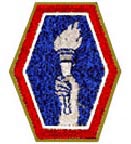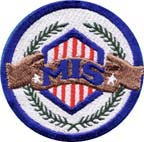Portraits of Courage~ GO FOR BROKE ~100th Infantry Battalion / 442nd Regimental Combat Team
|
 |
 |
 |
| Background December 7, 1941, "a day that will live in infamy...!" And for those of Japanese descent living in America at the time, a day that transformed their lives in ways without measure. At first there was shock and disbelief that was deeply personal - "My Fatherland, the land of my birth, attacked my adopted country. How crazy is that...?" Then, embarrassment and guilt - the former because in your heart you still are from your parent country, though you've chosen to live here; the latter because in some preposterous way you feel responsible for all the devastation and lives lost. Finally, shame because of the stealth and deceit in carrying out the infamous attack. And, shame is very Japanese... |
| Personal Journey My parents, like so many of their generation, merely accepted their government's decision to place them in concentration camps for the duration. Dad was an immigrant alien, having been born in Hiroshima, Japan, and until 1952 was kept by law from becoming a citizen of this country. Mom, born near Fremont, California, was an American citizen. There is this thing in Japanese culture, an over-riding sense of obligation and deference to those in positions of power or who command respect - a doctor in a white coat, a judge, a teacher, or the President of the United States. Respect is due without question... In March of 1942 my family was initially interned at the Merced (California) county fair grounds, a venue chosen by most regions and localities along the west coast to temporarily house some 120,000 internees. Soon we would transfer by train to the interior, away from the coast, to a remote locale in south-eastern Colorado, a place called Granada... |
| Setting In the late summer of 1942, the town of Granada was very much as it is today, a rural farming area in the vast sandy dust-belt area of the state. At the time, there was likely a gas station, a grocery store, a local Post Office, and several businesses along the main drag. There were only dirt sidewalks throughout town, a condition visible even now. Today, the grocery store is an updated version, one of those multi-service affairs found virtually everywhere across America, providing not only gasoline, but groceries and food stuffs, clothing, household goods, tourist trinkets, and coffee and donuts to sustain one on those long stretches of country roads between small towns. Many of the businesses today are mere shadows of their former incarnations, their edifices closed and dark and boarded up... Amache was the name of the Granada concentration camp we were to call home. The name was taken from Amache Ochinee Prowers, the Native American wife of John Prowers, for whom the county was named. Here some 7,597 internees from various communities primarily in California's vast agricultural Central Valley would live out the war behind barbed wire, for our own protection, and gun towers with machine guns ironically facing inward... |
| Patriotism and The Call to Duty In January 1943, the U.S. War Department announced the formation of the segregated 442nd Regimental Combat Team (RCT) made up of Nisei volunteers from Hawaii and the mainland concentration camps. The Hawaiian volunteers had earlier been established as the 100th Infantry Battalion, which was then later merged with the 442nd. The motto of this unit - Go For Broke - means "Give it your all," "Shoot the works." During the course of the war 31 Nisei volunteers from Amache were killed in action... How is it that a people, most of whom were American citizens at the time, deprived of the rights guaranteed by the Constitution of habeas corpus and due process, detained behind barbed wire and gun towers as suspect aliens, and for all intents and purposes accused, convicted, judged, and sentenced without trial because they looked like the enemy, how did this people in trust and good faith send forth their sons, husbands, fathers, uncles and brothers to fight in the armed forces of the United States...? |
| "A Jap is a Jap...!" ~ General John L. DeWitt |
| Those young Nisei, like so many of their American counterparts, were filled with the idealism of youth, with a patriotism that belied the fact that they volunteered out of concentration camps, and more to the point, these young men held a deep and abiding determination to prove they were truly American... |
| "The principle on which this country was founded and by which it has been governed is that Americanism is a matter of the mind and heart; Americanism is not, and never was, a matter of race or ancestry..." ~ President Franklin D. Roosevelt |
| Daring In October of 1944 the 442nd Regimental Combat Team / 100th Infantry Battalion was sent to rescue the Texas Lost Battalion, members of the 1st Battalion, 141st Regiment of the 36th Texas Infantry Division that was cut off and surrounded by German forces on a steep ridge in the forest east of Biffontaine. In 6 days of fierce fighting, the 442nd / 100th sustained 800 casualties in saving the 214 Texans... |
| Battle Record The 442nd Regimental Combat Team / 100th Infantry Battalion was the most decorated unit in all United States' military history for its size and length of service. Their record speaks for itself:
|
| Japanese Americans coming out of the concentration camps also served with distinction in the Military Intelligence Service (MIS) and fought as linguists in the Pacific theatre helping to bring the war there to an early close. On July 15, 1946, the 442nd Regimental Combat Team was honored with a special Presidential Parade in Washington, D.C., where it received from President Harry S. Truman its 7th Presidential Unit Citation. President Truman remarked on the occasion, "I can't tell you how much I appreciate the opportunity to tell you what you have done for this country. You fought not only the enemy, but you fought prejudice and you won. You have made the Constitution stand for what it really means: the welfare of all the people, all the time..." |
| "We are a nation of differences. Those differences don't make us weak. They're the source of our strength." ~ President Jimmy Carter. |
| Post Script: * After a thorough re-examination of the combat records of the 442nd Regimental Combat Team / 100th Infantry Battalion, President Bill Clinton on June 21, 2000, bestowed an additional 22 Congressional Medals of Honor to those Nisei who exhibited the ultimate in valor while serving their country. Many of the Medals of Honor were awarded posthumously and presented to the families of recipients. This was America At Its Best. |